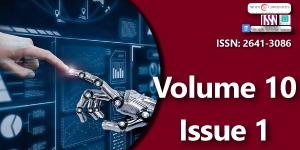Exploring the Utilization of Artificial Intelligence in Nursing Education in a Tertiary Institution: A Case Study of Al-hikmah University, Ilorin, Nigeria
Main Article Content
Abstract
Abstract
Introduction: Exploration of Artificial Intelligence (AI) in tertiary education focusing on its impact on learning outcomes and practical skill development serves as a strong metric for evaluating alignment with educational standard. AI-based tools such as virtual simulations and intelligent tutoring systems are explored as innovative approaches to addressing challenges in traditional nursing education, such as limited clinical placements and the need for personalized learning.
Aim: This study is aimed at assessing the extent of AI integration, identifying implementation challenges, and evaluating its potential benefits on students' academic performance, clinical decision-making, and skill acquisition.
Methodology: A descriptive cross-sectional design was employed, with a sample of 165 participants (160 students and 5 Academic Staff). Data were collected using structured questionnaires and analyzed using t - tests and ANOVA to evaluate the hypotheses.
Results: Students exposed to AI reported significantly improved learning outcomes, including higher academic performance and better clinical decision-making skills (t = 3.57, p < 0.001). Additionally, those engaged in AI-driven clinical simulations demonstrated better practical skill development compared to those trained with traditional methods (F = 10.32, p < 0.001). Key findings include limited access to AI tools, inadequate training, poor internet connectivity, and financial constraints.
Conclusion: AI integration holds substantial promise for enhancing nursing education at Al-Hikmah University. Increased access to AI resources, providing faculty and student training, improving technological infrastructure, and formally integrating AI into the nursing curriculum. AI has the potential to transform nursing education by providing scalable, accessible, and personalized learning experiences, essential for preparing students for the complexities of modern healthcare.
Downloads
Article Details
Copyright (c) 2016 Abdulmumeen Ibrahim O, et al.

This work is licensed under a Creative Commons Attribution-NonCommercial 4.0 International License.
Liu X, Chen Z, Wang L. Global trends in AI application for nursing education. Adv Health Sci Educ. 2022;27(1):58-75.
Smith J, Jones P. Personalized learning and AI in nursing education: A new approach to student engagement. J Educ Technol Healthc. 2021;18(3):102-118.
Ndukwe CC, Amadi I. Intelligent Tutoring Systems in Nursing Education: Enhancing Learning Outcomes. Afr J Nurs Midwifery. 2020;12(3):135-144.
Božić M. Artificial Intelligence in Nursing Education. Int J Nurs Educ. 2024;33(4):201-215.
Williams H, Adeola M, Okeke U. AI applications in nursing education: Reducing faculty workload and improving student outcomes. Nurse Educ. 2021;26(4):275-286.
Oluwafemi TA. Challenges to AI adoption in Nigerian nursing institutions. Niger J Nurs. 2022;14(2):59-68.
Adewale O, Akinlolu A, Osinubi K. AI in nursing education: Challenges and opportunities in Nigeria. J Nurs Health Sci. 2023;15(2):112-123.
Omotosho T, Akinola E. Ethical implications of AI in healthcare and nursing education. Ethics Health Educ. 2021;29(5):322-337.
Andrews R, Carter J. Artificial intelligence in nursing curricula: Preparing future nurses for technological advancements in healthcare. Nurse Educ Today. 2021;98(6):456-470.
Fernandez L, Garcia P. AI and virtual reality in clinical simulations for nursing students: A systematic review. Simul Healthc. 2023;45(5):122-138.
Kim H, Lee J. Evaluating AI-based clinical simulations for nursing students in critical care settings. Clin Simul Nurs. 2021;52(3):203-212.
Wilson G, Adams L. Exploring the role of AI in reducing cognitive load in nursing students. J Cogn Nurs. 2023;19(3):202-216.

